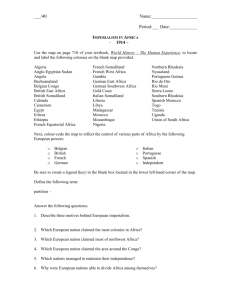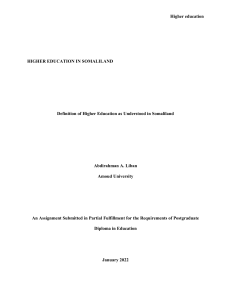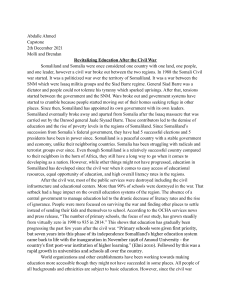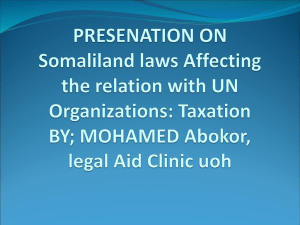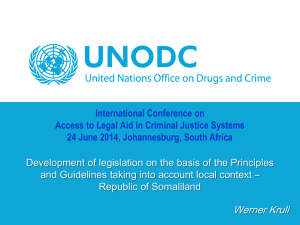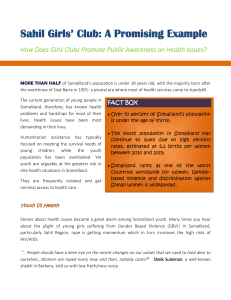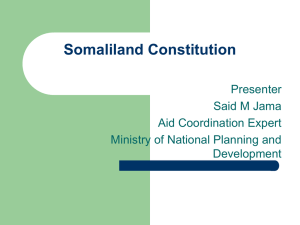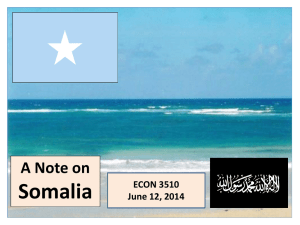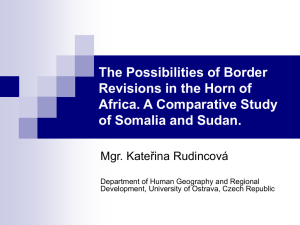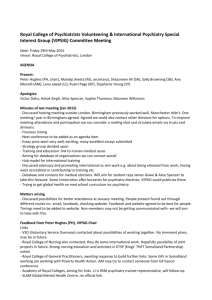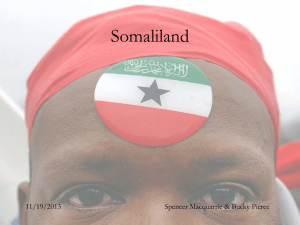Somaliland-Presentation.jpg
advertisement
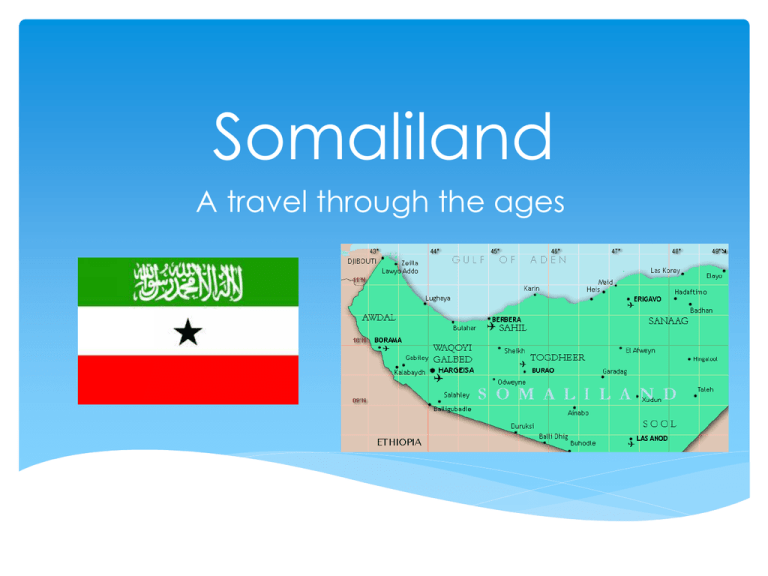
Somaliland A travel through the ages Pre-History In a site located outside Hargeisa, cave paintings were found dating back to 10’000 years ago. These cave paintings “…were untouched and intact for nearly 10,000 years until their recent discovery. The paintings show an indigenous people worshiping cattle. Pre-History cont’d There are also paintings of giraffes, domesticated canines and wild antelopes, with images of cows wearing ceremonial robes while next to them are some of these people prostrating in front of the cattle. The Las Geel caves and their paintings have become a major tourist attraction and a national treasure. The caves were even visited by a French archaeological team during November and December 2002.” History of Independance “The British Somaliland protectorate became briefly independent on June 26, 1960, and the first 4 cabinets who signed the declaration of independence were as shown here. From far left side: Ali Garad Jama(Sool), Haji Ibrahim Nur Jama(Awdal), Ahmed Kayse(Sanag) Bottom row far left: Mohammed Haji Ibrahim Egal(Togdher), Representative of the Queen and the Governor of Somaliland Protectorate. History of Independence cont’d On July 1, 1960, the two territories united as planned to form the Somali Republic. A government was formed by Abdullahi Issa, with Aden Abdullah Osman Daar as President and Abdirashid Ali Sharmarke as Prime Minister (later to become President, from 1967 to 1969). On July 20, 1961 and through a popular referendum, the Somali people ratified a new constitution, which was first drafted in 1960. In 1967, Muhammad Haji Ibrahim Egal became Prime Minister, a position to which he was appointed by Shermarke. Shermarke would be assassinated two years later by one of his own bodyguards. History of Independence cont’d His murder was quickly followed by a military coup d’état on October 21, 1969 (the day after his funeral), in which the Somailan Army seized power without encountering armed opposition. The putsch was spearheaded by Major General Mohamed Siad Barre, who at the time commanded the army. The new regime would go on to rule Somalia for the next 30 years. By the 1990s, the moral authority of Barre's government had collapsed. Many Somalis had become disillusioned with life under military dictatorship. The government became increasingly totalitarian, and resistance movements, encouraged by Ethiopia, sprang up across the country, eventually leading to the Somali Civil War.” He was soon over thrown from power. Somaliland May th 18 ,1991 “Although the SNM at its inception had a unionist constitution, it eventually began to pursue a separatist agenda, looking to secede from the rest of Somalia. Under the leadership of Abdirahman Ahmed Ali Tuur, the local administration declared the north-western Somali territories independent on 18 May 1991. Tuur then became the newly-established Somaliland polity's first President, but subsequently renounced the separatist platform in 1994 and began instead to publicly seek and advocate reconciliation with the rest of Somalia under a power-sharing federal system of governance. Somaliland May 18th,1991 cont’d Muhammad Haji Ibrahim Egal was appointed as Tuur's successor in 1993 by the Grand Conference of National Reconciliation in Borama, which met for four months, leading to a gradual improvement in security, as well as a consolidation of the new territory. Egal was reappointed in 1997, and remained in power until his death on May 3, 2002. The vice president,Dahir Riyale Kahin, who was during the 1980s the highestranking National Security Services (NSS) officer in Bebera in Siad Barre's government, was sworn in as president shortly afterwards. In 2003, Kahin became the first elected president of Somaliland.” Voting For His Excellency Ahmed Mahamoud Silanyo After the results were announced, Kahin congratulated Silanyo and reiterated that he would step down. The Supreme Court must endorse the results within 15 days and the incumbent president hand over power within 30 days. Silanyo was sworn in on 27 July at a ceremony attended by officials of Djibouti, Ethopia and Kenya. Conclusion Ladies and gentlemen, respectful community members of Somaliland which are here today, it is certainly an honour for me to share with you this little history of our nation and I urge to all of you to contribute towards today, by building the foundation of our community in all levels so that we can become a role model for our children and build a community which leaves legacy to their people, May Allah bless all of us and make possible of our dreams to come true Aamiin Aamiin. Long live Somaliland and long live his Excellency our president Ahmed Mohamed Mohamud (siilaanyo). Prepared By Abdikarim Haji Ibrahim Nur Proud member of Somaliland Canadian community Ottawa, Ontario, Canada Thank You.

